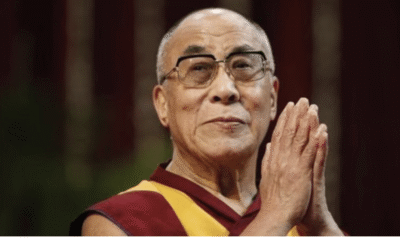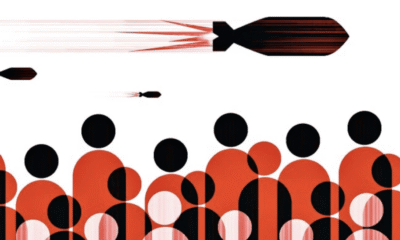
|
Getting your Trinity Audio player ready...
|
(The article was originally published by Indian Express on August 12, 2023 as a part of Dr Madhav’s column titled ‘Ram Rajya’. Views expressed are personal.)
Mohammad Ali Jinnah’s Two-Nation Theory was fragile and lacklustre. Intellectually, it was hollow and far removed from objective reality. Muslims lived all across India. There couldn’t have been a separate homeland for all of them except through a mammoth exercise of exchange of population. Jinnah and Ambedkar talked about it briefly, but both seem to have realised its impracticability.
Still, Jinnah succeeded in raking up temporary emotions and mobilising Muslim opinion in his favour. Its fallacy was proven on the day India was partitioned. Of the hundred million, only a little more than half of the Muslim population went over to Pakistan. Rest remained in India. In just two decades, the much-touted Two-Nation Theory returned to haunt Pakistan when the Bengali-speaking Muslims wanted their own homeland and secured Bangladesh in 1971.
The Partition of India was a meaningless and reckless act. Across the border, for Saadat Hasan Manto, the famed author, it was all sheer madness. He wrote about the women who had been raped. “What will happen to those bellies — Would the off-spring belong to Pakistan or India?” Manto questioned in innocence and grief. However fallacious the theory may be, it has not only divided the territory but also hearts. A deep division of hearts, created by Partition, continues to trouble the two communities in South Asia. In Pakistan’s Constituent Assembly in August 1947, Jinnah promised a country where minorities would have equal rights as the majority. But Pakistan became a quintessential theocracy. Jinnah knew well that there was no glue to keep the country united except Islam. To that was added, “hate India”.
Will the Partition end? Will Akhand Bharat be achieved? These questions are relevant for some. But the bigger and more immediate question should be about the legacy of Partition in the form of the division of hearts. Will Jinnah’s ghost continue to haunt us forever?
Partition was not inevitable even in the early 1940s. But then, the British were in a hurry to leave. Louis Mountbatten arrived in India in March 1947 with the mandate to free the country before June 1948. After meeting Jinnah, “a psychopathic case”, Mountbatten decided not to wait for that long and leave in less than three months.
The partition of India was premised on the theory that Hindus and Muslims cannot live together. Jinnah, who was once hailed as “the Ambassador of Hindu-Muslim Unity”, changed colour by the mid-1930s and argued that the two were separate “nations”.Jinnah began his political career as a nationalist. He once declared that he wanted to become a “Muslim Gokhale”. On his part, Gokhale described him as the “best ambassador of Hindu-Muslim unity”. But in three decades, Jinnah became just the opposite — the wrecker of Indian unity. He won.
Gandhi journeyed in the opposite direction. He had himself confessed his obsession with Hindu-Muslim unity when he entered the Congress in 1915. He pursued policies that Hindus complained about as being “appeasement” of Muslims. But, as the divisive rhetoric of the Muslim leadership and Jinnah grew louder and more shrill, he realised that he was chasing a mirage.
The Pakistan Resolution of the Muslim League at its Lahore session in 1940 was the proverbial last straw. In the eight years after that, preserving India’s unity became Gandhi’s singular obsession. He even declared that his other obsession with “Hindu-Muslim unity can wait”. He went to the extent of proposing to Jinnah that he should take over the leadership of the entire country and offering to Huseyn Shaheed Suhrawardy to work as his secretary if only the latter were ready to keep Bengal united. Gandhi lost.
Louis Fischer, in his best-selling book The Life of Mahatma Gandhi, insists that Gandhi had rejected all the British offers of transfer of power: The Cripps Mission in 1942, the Cabinet Mission in 1946, and the Mountbatten Plan in 1947 because they were based on Jinnah’s premise that Hindus and Muslims were separate. Gandhi called the Mountbatten Plan “a wooden loaf”, difficult to eat and impossible to digest. All this was because of Gandhi’s “devotion to the idea of a united India”, Fischer writes.
Gandhi could not reconcile the fact that a “maniac” and “an evil genius” like Jinnah could have his way, while there was nobody among his disciples to stand up and resist. Jawaharlal Nehru, who once called Partition a “fantastic nonsense”, reconciled quickly and ominously declared in April 1947 that “those who stand as an obstacle in our way should go their own way”.
Nehru was a believer in freedom “at all costs”. But as the freedom movement reached closer to its goal, Nehru included partition also as one of the costs. So did others, the “tired old men, hungry for power”, as Ram Manohar Lohia said. In India, Nehru became the Prime Minister, while in Pakistan, Manto was branded a traitor and thrown into jail, and died a broken man in 1955, at the age of 42.
Gandhi too was shattered. “My life’s work seems to be over. I hope God will spare me further humiliation”, he bemoaned, pleading in agony, “I shall perhaps not be alive to witness it, but should the evil I apprehended overtake India and her Independence be imperilled, let posterity know what agony this old soul went through thinking of it. Let it not be said that Gandhi was a party to India’s vivisection”.
It is a travesty that Jinnah, a non-practising Muslim, became the father of Pakistan. He died a natural death. But Gandhi, a Sanatani Hindu, blamed by Jinnah and the Muslim League of Hinduising politics, died at the hands of a Hindu.
History teaches lessons, not to reverse it, but to prevent it from repeating. “This day will not only inspire us to eliminate the poison of discrimination, animosity and ill will, but it will also strengthen unity, social harmony and human sensibilities,” Prime Minister Narendra Modi exhorted, calling for August 14 to be observed annually as the Partition Horrors Remembrance Day.




